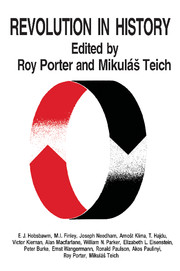Book contents
- Frontmatter
- Contents
- Notes on contributors
- Introduction
- 1 Revolution
- 2 Revolution in antiquity
- 3 Social devolution and revolution: Ta Thung and Thai Phing
- 4 The bourgeois revolution of 1848–9 in Central Europe
- 5 Socialist revolution in Central Europe, 1917–21
- 6 Imperialism and revolution
- 7 Socio-economic revolution in England and the origin of the modern world
- 8 Agrarian and industrial revolutions
- 9 On revolution and the printed word
- 10 Revolution in popular culture
- 11 Revolution in music – music in revolution
- 12 Revolution and the visual arts
- 13 Revolution and technology
- 14 The scientific revolution: a spoke in the wheel?
- 15 The scientific-technical revolution: an historical event in the twentieth century
- Index
Introduction
Published online by Cambridge University Press: 05 February 2015
- Frontmatter
- Contents
- Notes on contributors
- Introduction
- 1 Revolution
- 2 Revolution in antiquity
- 3 Social devolution and revolution: Ta Thung and Thai Phing
- 4 The bourgeois revolution of 1848–9 in Central Europe
- 5 Socialist revolution in Central Europe, 1917–21
- 6 Imperialism and revolution
- 7 Socio-economic revolution in England and the origin of the modern world
- 8 Agrarian and industrial revolutions
- 9 On revolution and the printed word
- 10 Revolution in popular culture
- 11 Revolution in music – music in revolution
- 12 Revolution and the visual arts
- 13 Revolution and technology
- 14 The scientific revolution: a spoke in the wheel?
- 15 The scientific-technical revolution: an historical event in the twentieth century
- Index
Summary
When Marx wrote that people make their own history but not under circumstances of their own choosing, by ‘make their own history’ he was referring to actions in the world of affairs. But the sentiment could apply no less well in another sense; to the circumstances in which people ‘make history’ by conceptualizing the past. There have been distinguished attempts to trace the rise of true historical scholarship out of the history-as-myth and history-as-legitimation which once held sway. But – viewed from a particular angle – these interpretations themselves all too easily look like refurbished, higher-order myths, ones perhaps serving the interests of the historical profession. Indeed, once we remember that the breakthrough into true historical scholarship is supposed not to have been made till the nineteenth century, and admit that the age of romanticism was a peculiarly fertile age for breeding myths of origins and antiquity, it is hard to escape the conclusion that the more we pride ourselves upon the acuteness of our historical vision, the more we also need therefore to humble ourselves by seeing this as a product of the particular times in which we live.
And who can deny that these are confused? Today when the future of mankind under nuclear threat looks less assured than formerly, it is hardly surprising that the clear lines of the past as well disappear before the eyes. Can historians see any historical pattern? The liberal West has hardly produced a secular philosophy of destiny since positivism, evolutionism, and their surrounding aura of progress theory collapsed amid their own ambiguities in the century of Total War. For its part, Marxism continues to guide fields of historical interpretation. But there are many Marxisms. And, moreover, the capacity of Stalinist regimes to ‘forget’ or ‘rewrite’ inconvenient pasts has hardly boosted the credit of Marxism as a vision of the dynamic linking of past and present, thought and action.
- Type
- Chapter
- Information
- Revolution in History , pp. 1 - 4Publisher: Cambridge University PressPrint publication year: 1986

